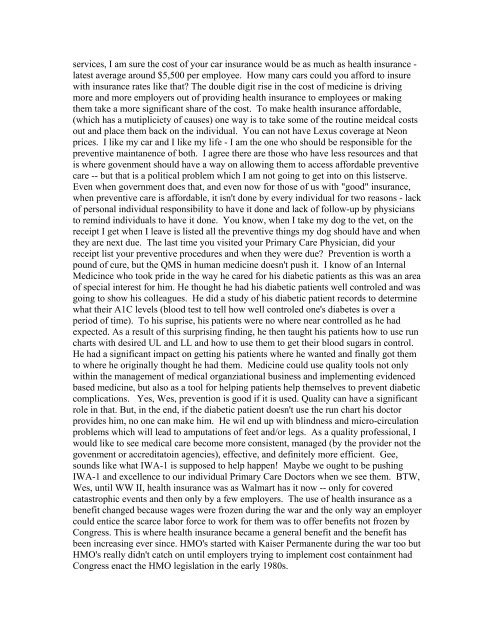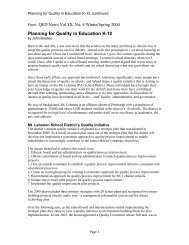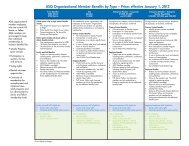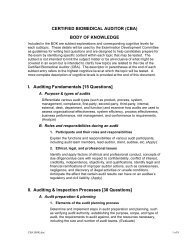Quality Progress - American Society for Quality
Quality Progress - American Society for Quality
Quality Progress - American Society for Quality
Create successful ePaper yourself
Turn your PDF publications into a flip-book with our unique Google optimized e-Paper software.
services, I am sure the cost of your car insurance would be as much as health insurance -<br />
latest average around $5,500 per employee. How many cars could you af<strong>for</strong>d to insure<br />
with insurance rates like that? The double digit rise in the cost of medicine is driving<br />
more and more employers out of providing health insurance to employees or making<br />
them take a more significant share of the cost. To make health insurance af<strong>for</strong>dable,<br />
(which has a mutiplicicty of causes) one way is to take some of the routine meidcal costs<br />
out and place them back on the individual. You can not have Lexus coverage at Neon<br />
prices. I like my car and I like my life - I am the one who should be responsible <strong>for</strong> the<br />
preventive maintanence of both. I agree there are those who have less resources and that<br />
is where govenment should have a way on allowing them to access af<strong>for</strong>dable preventive<br />
care -- but that is a political problem which I am not going to get into on this listserve.<br />
Even when government does that, and even now <strong>for</strong> those of us with "good" insurance,<br />
when preventive care is af<strong>for</strong>dable, it isn't done by every individual <strong>for</strong> two reasons - lack<br />
of personal individual responsibility to have it done and lack of follow-up by physicians<br />
to remind individuals to have it done. You know, when I take my dog to the vet, on the<br />
receipt I get when I leave is listed all the preventive things my dog should have and when<br />
they are next due. The last time you visited your Primary Care Physician, did your<br />
receipt list your preventive procedures and when they were due? Prevention is worth a<br />
pound of cure, but the QMS in human medicine doesn't push it. I know of an Internal<br />
Medicince who took pride in the way he cared <strong>for</strong> his diabetic patients as this was an area<br />
of special interest <strong>for</strong> him. He thought he had his diabetic patients well controled and was<br />
going to show his colleagues. He did a study of his diabetic patient records to determine<br />
what their A1C levels (blood test to tell how well controled one's diabetes is over a<br />
period of time). To his suprise, his patients were no where near controlled as he had<br />
expected. As a result of this surprising finding, he then taught his patients how to use run<br />
charts with desired UL and LL and how to use them to get their blood sugars in control.<br />
He had a significant impact on getting his patients where he wanted and finally got them<br />
to where he originally thought he had them. Medicine could use quality tools not only<br />
within the management of medical organziational business and implementing evidenced<br />
based medicine, but also as a tool <strong>for</strong> helping patients help themselves to prevent diabetic<br />
complications. Yes, Wes, prevention is good if it is used. <strong>Quality</strong> can have a significant<br />
role in that. But, in the end, if the diabetic patient doesn't use the run chart his doctor<br />
provides him, no one can make him. He wil end up with blindness and micro-circulation<br />
problems which will lead to amputations of feet and/or legs. As a quality professional, I<br />
would like to see medical care become more consistent, managed (by the provider not the<br />
govenment or accreditatoin agencies), effective, and definitely more efficient. Gee,<br />
sounds like what IWA-1 is supposed to help happen! Maybe we ought to be pushing<br />
IWA-1 and excellence to our individual Primary Care Doctors when we see them. BTW,<br />
Wes, until WW II, health insurance was as Walmart has it now -- only <strong>for</strong> covered<br />
catastrophic events and then only by a few employers. The use of health insurance as a<br />
benefit changed because wages were frozen during the war and the only way an employer<br />
could entice the scarce labor <strong>for</strong>ce to work <strong>for</strong> them was to offer benefits not frozen by<br />
Congress. This is where health insurance became a general benefit and the benefit has<br />
been increasing ever since. HMO's started with Kaiser Permanente during the war too but<br />
HMO's really didn't catch on until employers trying to implement cost containment had<br />
Congress enact the HMO legislation in the early 1980s.
















